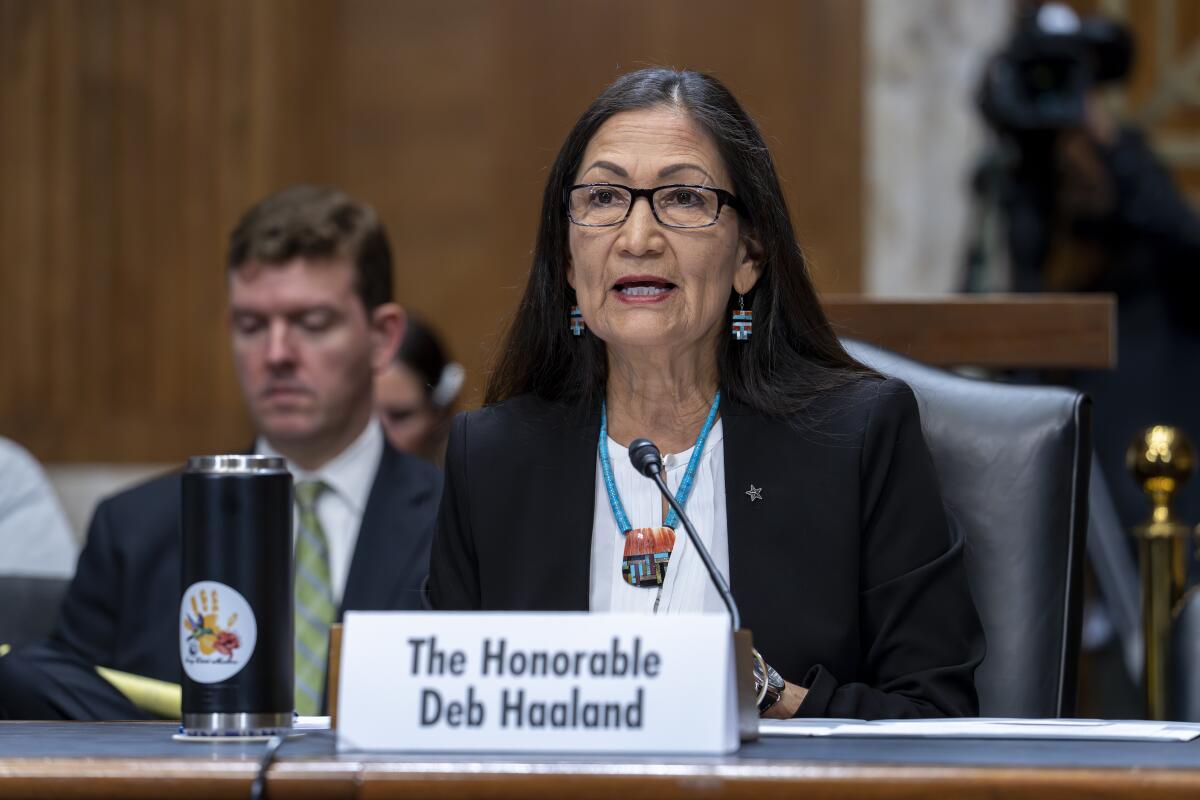Protest derails planned celebration of 20-year ban on oil drilling near Chaco national park

- Share via
ALBUQUERQUE — It was supposed to be a homecoming of sorts for U.S. Interior Secretary Deb Haaland, after her agency spent months hosting public meetings and talking with Native American leaders about curbing the pace of oil and gas development in the San Juan Basin and protecting culturally significant sites.
But her return to Chaco Culture National Historical Park on Sunday was derailed when a group of Navajo landowners blocked the road, upset with the Biden administration’s recent decision to enshrine for the next 20 years what previously had been an informal 10-mile buffer around the UNESCO World Heritage Site.
Social media posts showed protesters yelling “Go home!” as some held signs that read “No trespassing on allottee land.”
The landowners and Navajo leaders have said Haaland and the Biden administration ignored efforts to reach a compromise that would have established a smaller buffer to protect cultural sites while keeping intact the viability of tribal land and private Navajo-owned parcels for future development.
Haaland was expected to gather Sunday in another location with tribal leaders to celebrate the withdrawal.
Haaland’s own pueblo of Laguna — about 100 miles to the south — is among those that have fought to protect a broad swath of land beyond park boundaries. Haaland has called Chaco a sacred place that holds deep meaning for Indigenous people whose ancestors called the area home.
“Efforts to protect the Chaco landscape have been ongoing for decades, as tribal communities have raised concerns about the impacts that new development would have on areas of deep cultural connection,” Haaland said in a statement earlier this month.
The region is made up of a patchwork of different ownership. Even though the Biden administration’s withdrawal applies only to federal land, Navajo officials and allotment owners said their interests will now be landlocked.
Navajo President Buu Nygren said in a statement Thursday that the weekend celebration was disappointing and disrespectful. It should have been canceled, he said.
“The financial and economic losses that are impacting many Navajo families as a result of the secretary’s recent land withdrawal are nothing to celebrate,” Nygren said. “As leaders of the Navajo Nation, we support the Navajo allottees who oppose the withdrawal of these public lands.”
Navajo Nation Council Speaker Crystalyne Curley said allotment owners were not adequately consulted, despite the federal government’s claims.
Industry groups also have backed the Navajo leaders and landowners, with some alleging that Haaland has conflicts of interest when it comes to oil and gas policy decisions.
A Republican-led U.S. House committee announced just days after the Chaco decision that it would investigate the secretary’s ties to an Indigenous environmental group that has protested fossil fuels.
Still, a coalition of environmental groups and Native American activists that campaigned for the restrictions has lauded Haaland’s order as a first step in protecting cultural sites and the region from pollution and climate change. The coalition also continues to lobby for legislation that would formalize the same buffer around the park, spanning more than 490 square miles of federal land.
A study published last fall by the Interior Department shows the withdrawal would not affect existing leases and that much of the area of interest by the industry for future development already is under lease or falls outside the boundary of what would be withdrawn.
Federal officials have operated under an informal pause when it comes to development around Chaco park for at least the last three presidential administrations, and supporters argue that Navajos had a seat at the table as the latest moratorium was discussed.
The All Pueblo Council of Governors, which is made up of many tribes that support the withdrawal, noted Sunday that it was joint discussions with the Navajos that began several years ago that prompted the withdrawal efforts.
More to Read
Sign up for Essential California
The most important California stories and recommendations in your inbox every morning.
You may occasionally receive promotional content from the Los Angeles Times.













